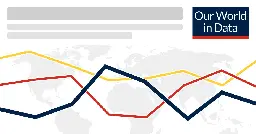Death rates from energy production per TWh
Death rates from energy production per TWh

ourworldindata.org
Death rates per unit of electricity production

First post on the fediverse. Hopefully it auto loads the link photo but if not I'll put it as the first comment. Sorry for anything incorrect in handling this.
